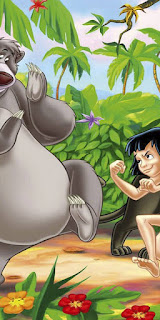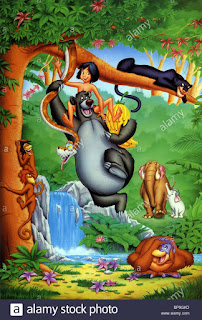The Jungle Book Themes
Loyalty and Family
Family and loyalty to family are themes running throughout the stories. From the moment Mowgli wanders into Mother and Father Wolf's cave they adopt him as their own, with Mother Wolf actually favoring him to his brothers on many occasions. The importance of the Pack is always emphasized and there is a hierarchy that ensures decisions are made as a family. Each of the animals lives in their own family and whatever the animal, when they get married and raise cubs of their own, they are permitted to leave their pack or group.Akela, his pack's leader and Lone Wolf, by leaving the jungle to protect him and later by defending him and the entire Pack from the red dogs. Kipling also continues the theme of family loyalty when Mowgli returns to Man and finds his pseudo-mother, whom he loves deeply and desires to protect above all else.
Loyalty to family is also paramount; at Mowgli's looking over, Raksha prepares herself to fight until the death for him. Mowgli also demonstrates his loyalty to
Loyalty to family is also paramount; at Mowgli's looking over, Raksha prepares herself to fight until the death for him. Mowgli also demonstrates his loyalty to
Importance of Rules and Laws
Courage
Most of the characters in The Jungle Book are brave and demonstrate their bravery through their willingness to defend, fight, or undertake an arduous quest. Mowgli repeatedly shows bravery in battle, killing Shere Khan, fighting the red dogs, and standing up to the villagers. Kaa is also brave when saving Mowgli from the monkeys; Baloo and Bagheera are courageous here as well. In the other stories, Rikki-tikki-tavi possesses enormous bravery by protecting his human family from the murderous cobras, attacking one with great skill in the bathroom, and disappearing into a burrow with the second. Little Toomai shores up his courage to watch the elephants dance, Kotuku ventures out into the foreboding wilderness to save his people from starvation, Kotick journeys for miles and miles to find a safe island, and Purun Dass embodies pacifist, noble courage both as a politician and a holy man. Kipling is keen on reinforcing the moral virtues considered important to late-19th-century Englishmen: bravery, loyalty, strength, rectitude, and a willingness to protect one’s dependents.
Coming Of Age
Mowgli becomes a young man as the book progresses, and the reader watches him grow from an impulsive and earnest man-cub into a leader. Like most adolescents, he believes he is not allowed to do as much as he wants to do, but readers see him grow out of that phase and learn patience and the importance of knowledge from his elders. It is also interesting to note that as he and Gray Brother are leaving the village, Mowgli notices a young woman walking towards them and seems captivated by her (not to mention his strange feelings for Messua), a sure indication he is becoming a man and beginning a new stage in his life. Mowgli’s coming of age is universal in that it mirrors all young people’s move from one stage of life to another, but it also possesses a melancholic singularity in that he will never be completely part of the world of man due to his upbringing and his knowledge of the jungle.






Wonderful post! The insights on wildlife safaris are truly engaging and informative. For anyone planning a trip to explore the majestic wildlife of Indian national parks, we provide the best tour and travel services. You can also find detailed information about wild tiger safari experiences. Keep sharing such valuable content!
ReplyDelete